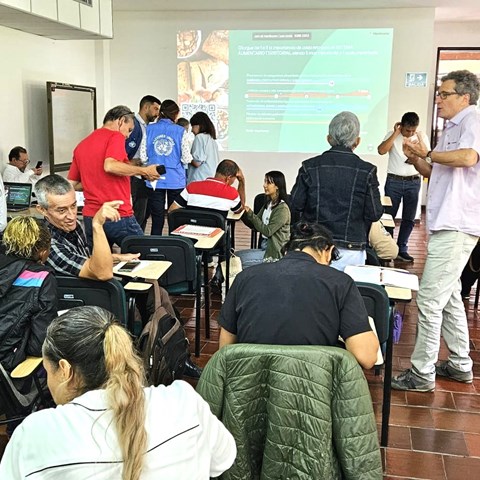Contact
Konstantinos Karantininis, Professor
Department of People and Society

On March 12, sixty participants attended a workshop in Palmira Sur to discuss food system issues in the region.
Located in the department of Valle del Cauca, Palmira Sur (650,000 inhabitants) includes six municipalities: Ginebra, El Cerrito, Palmira, Candelaria, Pradera, and Florida. Palmira Sur’s landscape is shaped by two distinct agricultural systems: large-scale commercial sugarcane monocultures in the flatlands and more diversified family farming in the hills. In this context, the main challenge for transitioning towards a sustainable food system is diversifying flatland agricultural production while boosting the socio-economic viability of hillside family farming. This means promoting agro-ecological production practices and models tailored to each scheme, creating more job income opportunities in both areas, increasing food supply and diversity, and addressing health issues linked to current diet patterns.
To build a shared understanding of the local food system, participants reviewed and discussed a territorial food system profile prepared by FAO and a synthesis of the previous workshop led by Agrosavia. During the session, FAO consultants collected action proposals from participants to inform the design of future programming and funding frameworks tailored to the territory. In parallel, Agrosavia and CIRAD, working closely with participants, identified key knowledge gaps that future research efforts could help address.
In the coming months, two in-depth studies will be carried out in collaboration with local universities. The first will focus on characterizing and developing a typology of family, peasant, ethnic and community producers in the region. The second will document and synthesize agroecological practices at small and medium-scale production levels, highlighting their contribution to sustainability and social inclusion. As part of the SASI process, participatory action research will explore two key areas: how to better integrate agroecological practices into existing production systems and how to reduce the territory’s food dependency, currently reliant on external sources for 80% of its food supply.
The next meeting in Palmira Sur will take place in June 2025. It will mobilize participatory methods to produce a collective vision for the future food system of Palmira Sur and the roadmap to get there.
Konstantinos Karantininis, Professor
Department of People and Society